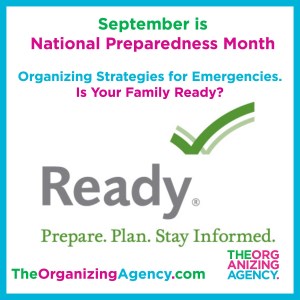BE PREPARED! Organization Strategies for National Preparedness Month
 September is National Preparedness month so ask yourself, how prepared are you? You may be wondering what exactly you should be prepared for, and that’s a great place to start. Identify your family’s needs and get organized now.
September is National Preparedness month so ask yourself, how prepared are you? You may be wondering what exactly you should be prepared for, and that’s a great place to start. Identify your family’s needs and get organized now.
Below are our best organizing tips for your Home Preparedness needs.
BUILD PREPAREDNESS KITS FOR YOUR HOME, OFFICE AND VEHICLE.
Assemble a handy kit, preferably in a single container that’s easy to take with you in case you’re evacuated abruptly. Make sure all your family members know where the kit is kept. Include the following items:
- Water — one gallon per person, per day
- Food — nonperishable (canned and dry goods are best)
- Flashlight and/or headlamp and extra batteries
- Battery powered or hand crank radio (NOAA Weather Radio, if possible)
- First aid kit
- One-week supply of medications and relevant medical paperwork for infirmed family members
- Multipurpose tool – can opener, pocketknife, file, screwdriver, etc.
- Personal hygiene and antibacterial items such as toothpaste, Wet Wipes, Purell, etc.
- Copies of personal documents such as passports, birth certificates, etc.
- Cell phone with chargers
- Family and emergency contact information
- Extra cash
- Emergency blanket
- Extra set of car/house keys and road maps of the area
- Baby formula, diapers, baby aspirin, etc., packed in portable diaper bag
- Games, activities, and comfort items (such as a stuffed animal) to aid in self-soothing for children
If you have family members with special needs, make sure to add any equipment or personal items they will require.
IF YOU HAVE CHILDREN:
One important step in making sure everything goes smoothly in times of crisis is to involve your children in the planning and preparation. This is a great way to teach them what to do in case of an emergency. Ask your kids what they would like to have with them in an emergency kit, and ask them to help you remember to keep the kits up-to-date, by marking their calendars to replace emergency food and water supplies and check batteries’ expiration dates as well. This will make the kids feel like they are a vital part of the process of protecting the family, while instilling in them critical preparedness techniques that will serve them well in the future.
IF YOU HAVE PETS:
Don’t forget your pets’ needs, too! Gather food, bowls, medications, a litter box and litter, paper towels, plastic trash bags, brushes, and a disinfecting household cleanser, as needed. You’ll also want to have a leash or harness, and a carrier for safely transporting your pet under whatever circumstances may arise.
AT HOME:
When disaster strikes and you’re in survival mode, you will fare well to have a sizable supply of non-perishable, easy to prepare canned and dry goods at home. Consider storing enough food supply for up to two weeks. And keep at least a three-day supply of water on hand for each family member, or one gallon per person, per day.
Make sure everyone at home knows where and how to shut off gas, electricity and water supplies to your home, in case they are home alone when something happens, whether it be a broken pipe or an earthquake.
AT WORK:
You need to be prepared to take shelter at work for at least 24 hours. Make sure you have food and water and other necessities (like medicines) in your kit. Also, be sure to have comfortable walking shoes stashed at the office, in case lack of available transportation requires you to walk a long distance.
A NOTE ON WATER:
Following a disaster, you may not have access to clean drinking water. You should have on hand at least one gallon of potable water, per person per day, however, you should consider storing extra to meet the needs of children and nursing mothers, pets or sick people, potential medical emergencies; or the demands of a warmer climate. During a heat wave, for instance, your water needs could double.
Store water in a cool, dark place, unopened, in its original container until you need it. If you prepare your own water bottles at home, use food grade storage containers (available at camping supply stores) and clean and rinse them thoroughly before use.
Make it a point this weekend to tackle one important preparedness task for you and your family. Which kit will you assemble and store first? Would you feel safer having one in the car than at the office? Make sure before you go to bed this Sunday, that you have prepared yourself and your loved ones… just in case.

